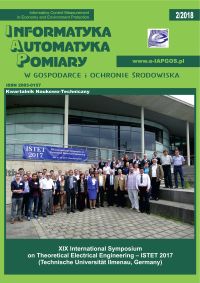ADVANCED MEMRISTOR MODEL WITH A MODIFIED BIOLEK WINDOW AND A VOLTAGE-DEPENDENT VARIABLE EXPONENT
Article Sidebar
Open full text
Issue Vol. 8 No. 2 (2018)
-
TRANSIENT MODELING OF AC MACHINES CONSIDERING SECOND ORDER EFFECTS
Olga Korolova, Juan de la Torre Cubillo, Bernd Ponick4-8
-
ANALYSIS OF AN ANTI-PARALLEL MEMRISTOR CIRCUIT
Valeri Mladenov, Stoyan Kirilov9-14
-
ADVANCED MEMRISTOR MODEL WITH A MODIFIED BIOLEK WINDOW AND A VOLTAGE-DEPENDENT VARIABLE EXPONENT
Valeri Mladenov, Stoyan Kirilov15-20
-
MATHEMATICAL MODELING AND CONTROL SYSTEM OF NEARLY ZERO ENERGY BUILDING
Ildar A. Sultanguzin, Hannes Toepfer, Ivan D. Kalyakin, Alexandr V. Govorin, Ekaterina V. Zhigulina, Sergey Yu. Kurzanov, Yury V. Yavorovsky21-24
-
HARMONIC DOMAIN MODEL OF AN OPEN-LOOP CONTROLLED PWM CONVERTER
Malte John, Axel Mertens25-29
-
MAGNETIC FIELD OF COAXIAL SQUARE COILS ENCLOSED WITH HIGH-PERMEABILITY MATERIAL
Anamarija Juhas, Neda Pekaric Nad, Hannes H. Toepfer30-34
-
A DISTRIBUTED METHOD FOR TRANSIENT SIMULATIONS THAT DYNAMICALLY CONSIDERS SUPPLEMENTARY RESULTS FROM AUTONOMOUS SOFTWARE AGENTS
Matthias Jüttner, Sebastian Grabmaier, Jonas Rohloff, Desirée Vögeli, Wolfgang M. Rucker, Peter Göhner, Michael Weyrich35-38
-
MULTISENSORS FOR WHOLE-CELL ANALYTICS
Ingo Tobehn-Steinhäuser, Margarita Günther, Stefan Görlandt, Steffen Herbst, Heike Wünscher, Thomas Ortlepp, Gerald Gerlach39-41
-
TOOLS FOR COMPARING THE RESULTS OF THE WORK OF SORTING ALGORITHMS
Larysa Gumeniuk, Vladimir Lotysh, Pavlo Gumeniuk42-45
-
MODIFIED, COMPLEMENTED TAXONOMY OF FAULTS IN FAULT-TOLERANT REAL-TIME SYSTEMS
Volodymyr Mosorov, Taras Panskyi, Sebastian Biedron46-49
-
THE APPLICATION OF REDUNDANCY IN LEACH PROTOCOL
Volodymyr Mosorov, Sebastian Biedron, Taras Panskyi50-53
-
ANALYSIS MEDICAL AND STEREOSCOPIC IMAGES BY E-MEDICUS SYSTEM
Tomasz Rymarczyk54-57
-
ANALYSIS OF THE EFFECTIVENESS OF SELECTED SEGMENTATION METHODS OF ANATOMICAL BRAIN STRUCTURES
Róża Dzierżak, Magdalena Michalska58-61
-
ANALYSIS OF METROLOGICAL PROPERTIES FIBER BRAGG GRATINGS WITH A CONSTANT AND VARIABLE PERIOD
Tomasz Zieliński, Piotr Kisała62-67
-
A COMPARISON STUDY OF THE FEATURES OF DC/DC SYSTEMS WITH SI IGBT AND SIC MOSFET TRANSISTORS
Karol Fatyga, Łukasz Kwaśny, Bartłomiej Stefańczak68-71
-
PROPOSAL FOR MANAGING ELECTRIC ENERGY QUALITY IN THE LV GRID USING ON-LOAD TAP CHANGER WITH A STATIC SYNCHRONOUS COMPENSATOR
Bartłomiej Mroczek, Karol Fatyga72-78
-
ASSESSMENT OF FUEL MOVEMENT IN COMBUSTION PROCESS BASED ON THE DIGITAL IMAGE
Łukasz Pater79-82
-
NONLINEAR ANALYSIS OF HIGH Q RADIO FREQUENCY ENERGY HARVESTING NETWORKS
Christian Merz, Gerald Kupris83-86
Archives
-
Vol. 10 No. 4
2020-12-20 16
-
Vol. 10 No. 3
2020-09-30 22
-
Vol. 10 No. 2
2020-06-30 16
-
Vol. 10 No. 1
2020-03-30 19
-
Vol. 9 No. 4
2019-12-16 20
-
Vol. 9 No. 3
2019-09-26 20
-
Vol. 9 No. 2
2019-06-21 16
-
Vol. 9 No. 1
2019-03-03 13
-
Vol. 8 No. 4
2018-12-16 16
-
Vol. 8 No. 3
2018-09-25 16
-
Vol. 8 No. 2
2018-05-30 18
-
Vol. 8 No. 1
2018-02-28 18
-
Vol. 7 No. 4
2017-12-21 23
-
Vol. 7 No. 3
2017-09-30 24
-
Vol. 7 No. 2
2017-06-30 27
-
Vol. 7 No. 1
2017-03-03 33
-
Vol. 6 No. 4
2016-12-22 16
-
Vol. 6 No. 3
2016-08-08 18
-
Vol. 6 No. 2
2016-05-10 16
-
Vol. 6 No. 1
2016-02-04 16
Main Article Content
DOI
Authors
Abstract
The main idea of the present research is to propose a new nonlinear ionic drift memristor model suitable for computer simulations of memristor elements for different voltages. For this purpose, a modified Biolek window function with a voltage-dependent exponent is applied. The proposed modified memristor model is based on Biolek model and due to this and to the use of a voltage-dependent positive integer exponent in the modified Biolek window function it has a new improved property - changing the model nonlinearity extent dependent on the integer exponent in accordance with the memristor voltage. Several computer simulations were made for soft-switching and hard-switching modes and also for pseudo-sinusoidal alternating voltage with an exponentially increasing amplitude and the respective basic important time diagrams, state-flux and i-v relationships are established.
Keywords:
References
Ascoli A., Corinto F., Senger V., Tetzlaff R.: Memristor Model Comparison. IEEE Circuits and Systems Magazine 2013, 89–105.
Ascoli A., Corinto F., Tetzlaff R.: Generalized Boundary Condition Memristor Model. Int. J. Circ. Theor. Appl. 44/2016, 60–84.
Biolek Z., Biolek D., Biolkova V.: SPICE Model of Memristor with Nonlinear Dopant Drift. Radioengineering 18/2009, 210–214.
Brandisky K., Georgiev Z., Mladenov V., Stancheva R.: Theoretical Electrical Engineering–Part 1 & 2. KING Publishing house, Sofia 2005.
Chua L.: Memristor–The Missing Circuit Element. IEEE Transactions on Circuit Theory 18(5)/1971, 507–519.
Corinto F., Ascoli A.: A Boundary Condition-Based Approach to the Modelling of Memristor Nanostructures. IEEE Transactions on Circuits and Systems - I, Regular Papers 59(11)/2012, 2713–2726.
Hristov M., Vassileva T., Manolov E.: Semiconductor elements. New knowledge, Sofia 2007.
MATLAB–7.12.0.635(R2011a) User’s Guide. The MathWorks, Inc.
Strukov D. B., Snider G. S., Stewart D. R., Williams R. S.: The missing memristor found. Nature 453(06932)/2008, 80–83.
Walsh A., Carley R., Feely O., Ascoli A.: Memristor circuit investigation through a new tutorial toolbox. ECCTD 2013, 1–4.
Article Details
Abstract views: 366
License

This work is licensed under a Creative Commons Attribution-ShareAlike 4.0 International License.






